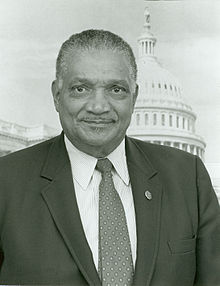Charles Hayes (politician)
| Charles Hayes | |
|---|---|
 |
|
| Member of the U.S. House of Representatives from Illinois's 1st district |
|
|
In office August 23, 1983 – January 3, 1993 |
|
| Preceded by | Harold Washington |
| Succeeded by | Bobby Rush |
| Personal details | |
| Born | February 17, 1918 Cairo, Illinois |
| Died | April 8, 1997 (aged 79) Chicago, Illinois |
| Political party | Democratic |
Charles Arthur Hayes (February 17, 1918 – April 8, 1997) was a member of the United States House of Representatives from Illinois.
Hayes was born in Cairo, Illinois, and graduated from Cairo's Sumner High School in 1935. He was a trade unionist from 1938 to 1983 and served as vice president of the United Food and Commercial Workers Union.
Hayes was elected as a Democrat to the Ninety-eighth Congress by a special election held on August 23, 1983, to fill the vacancy caused by the resignation of Harold Washington, who had been elected mayor of Chicago. Hayes was reelected to the Ninety-ninth and to the three succeeding Congresses, and served from August 23, 1983 to January 3, 1993. His candidacy for renomination in 1992 to the One Hundred Third Congress was unsuccessful, as he was defeated in the Democratic primary by Bobby Rush, partly due to the House banking scandal.
While a representative, Hayes was on the Committee on Education and Labor and Small Business Committee. He was most noted for pieces of legislation to encourage school dropouts to reenter and complete their education.
Hayes was a resident of Chicago for most of his adult life. Congressman Hayes was a prolific union man for 45 years. In the 1950s, he raised funds that fueled Dr. Martin Luther King, Jr.'s voter registration drive in the South. He was a civil rights leader who worked closely with King in the Southern Christian Leadership Conference during the 1960s. Later, he was one of major labor leaders arrested during the 1980s anti-apartheid protests that eventually won the freedom of Nelson Mandela. Congressman Hayes was the CBTU's first executive vice president, serving until 1986.
...
Wikipedia
